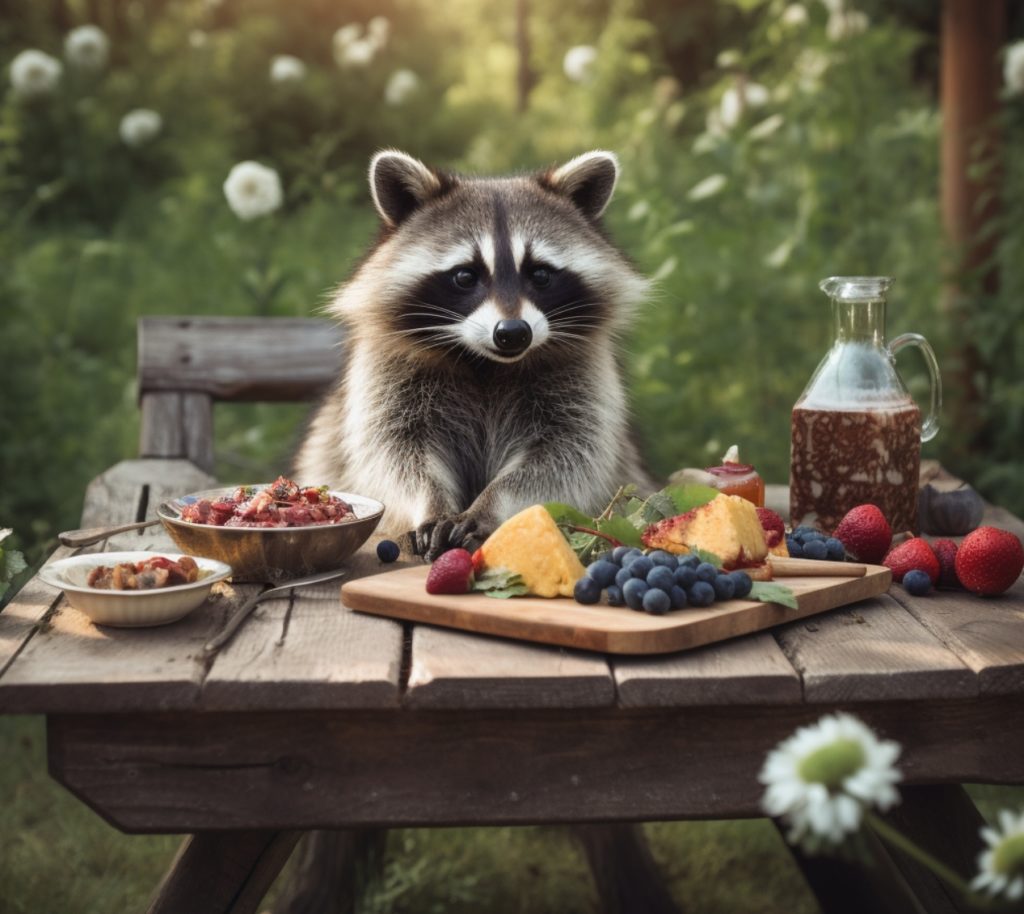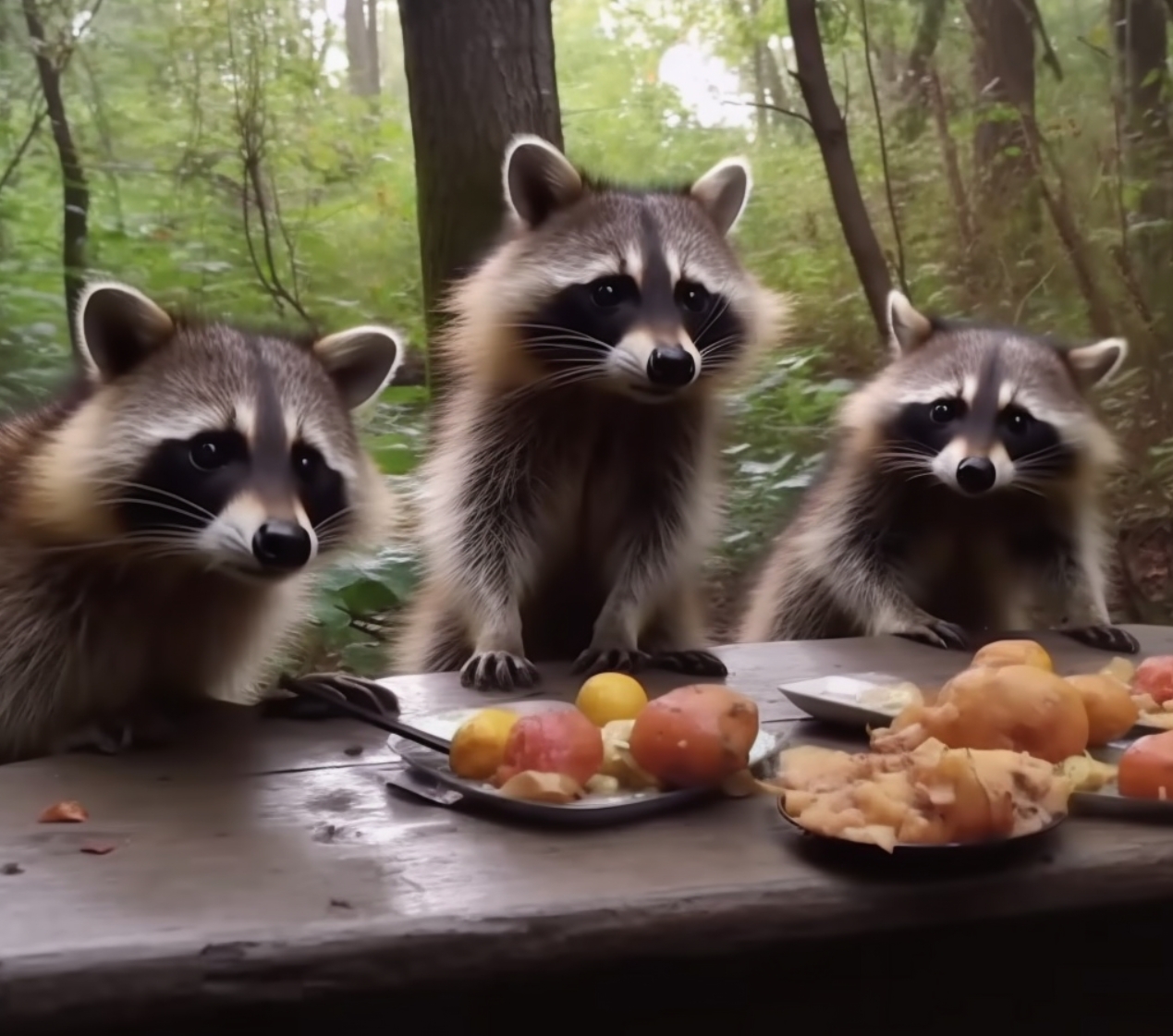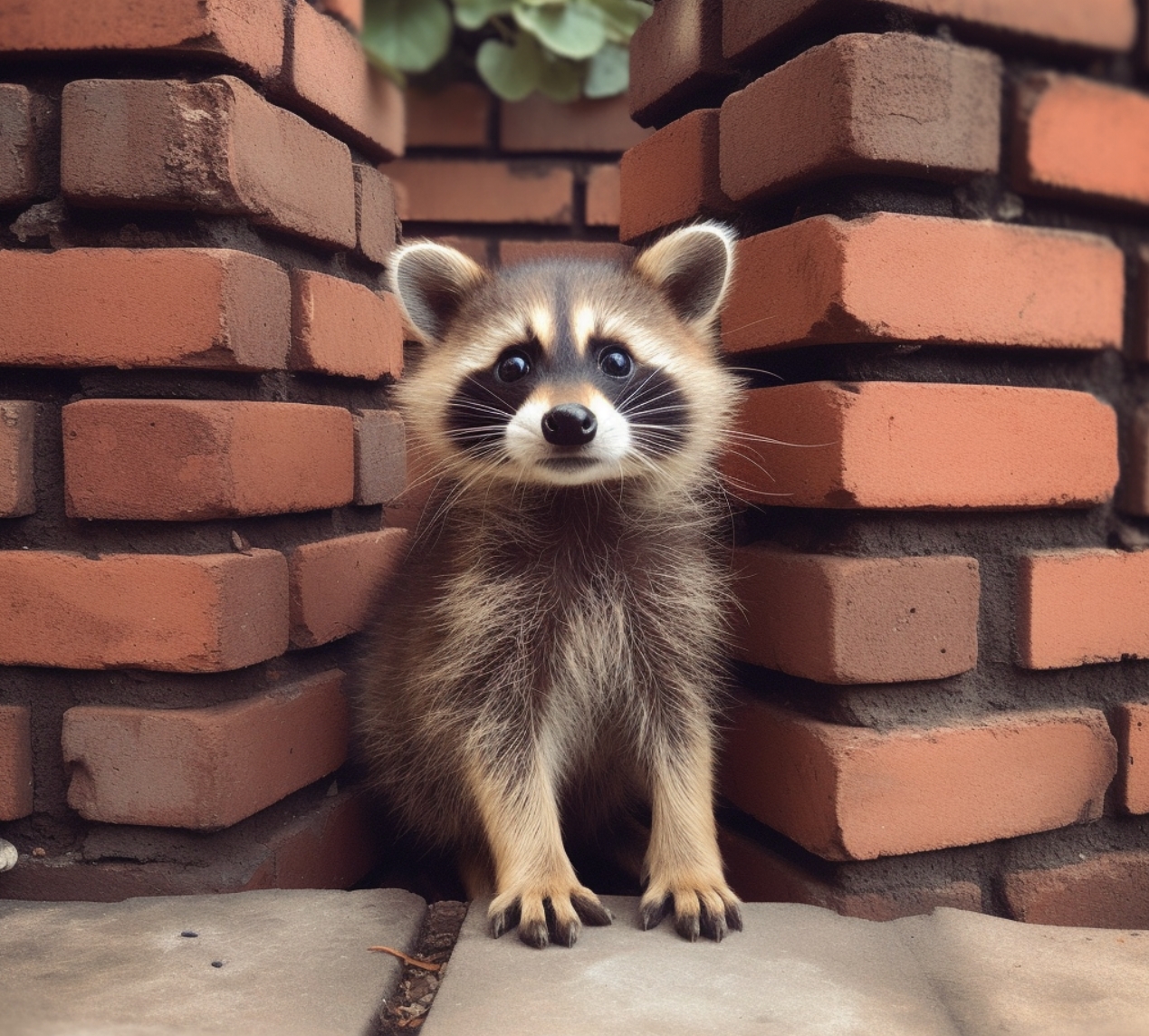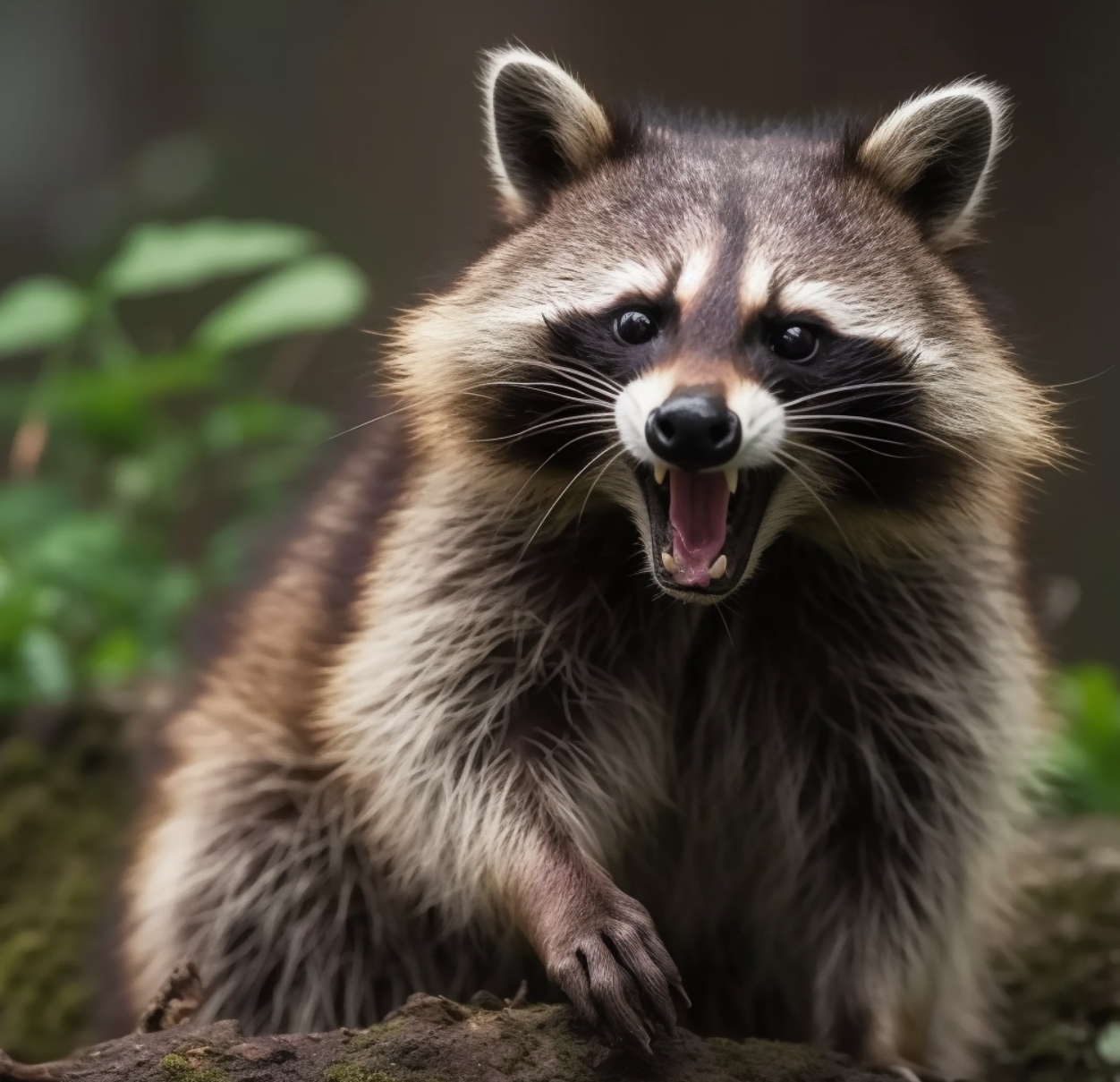Raccoons are fascinating creatures that have captured the attention and curiosity of many people due to their intelligence, dexterity, and adaptability. But one question that often comes up when discussing these masked bandits is: what do raccoons like to eat?
But, what do raccoons eat exactly? Their diet is an essential part of understanding their behaviors, habitats, and interactions with the environment. In the following table, we delve deeper into the details of a raccoon’s diet, spanning from their general food preferences to specific eating habits, which will provide a broader understanding of these fascinating creatures.
| Category | General Diet | Examples of Preferred Foods | Foods to Avoid | Nutritional Requirements | Feeding Habits and Behaviors | Impact on Health or Behavior |
|---|---|---|---|---|---|---|
| General Raccoon Diet | Omnivores | Fruits, Nuts (excluding macadamia), Insects, Fish | Chocolate, Avocado, Onions, Garlic, Alcohol, Junk food, Spoiled food | High in protein, moderate in fat, low in carbohydrate | Mostly nocturnal, opportunistic foragers, capable of opening containers and using their paws to handle food | High fat, sugary or processed foods can lead to obesity, diabetes, and other health issues. |
| Raccoons and Fruits | Fruitarian within Omnivore | Apples, Berries, Figs | Unripe or Rotten Fruits | High in fiber, vitamins, and water | Typically prefer ripe fruits, will climb trees to reach them | Poor nutrition from unbalanced diet can lead to deficiencies, poor health. |
| Raccoons and Chocolate | Not Safe | N/A | Chocolate, Coffee | N/A | Should never be fed to raccoons | Ingesting chocolate can cause theobromine poisoning, which can be fatal. |
| Raccoon’s Favorite Foods | Omnivores | Corn, Fish, Eggs, Fruits, Most Nuts | Macadamia Nuts | High in protein, moderate in fat, low in carbohydrate | Often seek out easy-to-obtain food sources | Overeating or eating high-fat foods can lead to obesity and related health problems. |
| Raccoons in Domestic Settings | Balanced Omnivore | Fruits, Vegetables, Proteins | High Fat/Processed Food, Alcohol | Balanced diet reflecting their natural diet | Will eat from bowls, can be taught to self-regulate diet | Overfeeding or unhealthy diet can lead to obesity, dental issues, and other health problems. |
| Baby Raccoons | Maternal Milk to Omnivore | Mother’s Milk, Insects, Nuts | Hard to Digest Foods, Garlic, Onions | Start with milk, then move to a varied diet | Initially feed on mother’s milk, then introduced to solid foods | Incorrect diet can lead to developmental issues and health problems. |
| Specific Questions about Raccoon Diet | Omnivores | Beetles, Certain Human Foods | Specific Allergens, Junk Food, Spoiled Food | Balanced diet reflective of natural omnivorous diet | May demonstrate specific preferences or avoid certain foods | Poor diet or consumption of toxic substances can lead to illness or behavioral changes. |
This table provides a comprehensive view of the dietary requirements and habits of raccoons, emphasizing the importance of a balanced diet and highlighting the risks of certain foods. Always consult with a professional when caring for a raccoon, and avoid feeding wild raccoons to prevent dependency on human food sources.
Raccoon Diets: Omnivores Extraordinaire
Contents
Raccoons are true omnivores, which means they eat both plants and animals. They have a highly varied diet, which can change depending on the season and what is available in their environment. Let’s take a look at the different types of food raccoons enjoy consuming.
Fruits and Vegetables

Raccoons love fruits and vegetables, with a particular fondness for berries, cherries, grapes, and apples. They also enjoy vegetables like corn, which they can often be found munching on in gardens and farm fields. In the wild, raccoons will forage for these plant-based foods, but they’re not above stealing from your garden or garbage bin if given the chance.
Insects and Invertebrates
As opportunistic feeders, raccoons will gladly feast on insects and invertebrates they come across. Some of their favorites include:
- Crickets
- Beetles
- Caterpillars
- Earthworms
- Slugs
Small Animals
Raccoons are skilled hunters and will consume a variety of small animals when the opportunity arises. Their diet can include:
- Birds and bird eggs
- Frogs and toads
- Fish
- Mice and other rodents
- Snakes
Human Food and Garbage
Perhaps what raccoons are best known for is their uncanny ability to raid human garbage and find food. They’re attracted to the smell of food waste, and their dexterous paws make it easy for them to open trash cans or dumpsters. Some of the human foods raccoons like to eat include:
- Leftovers
- Pet food
- Fruits and vegetables
- Bread and baked goods
- Meat and fish scraps
Brands Raccoons Love
Believe it or not, there are certain brands that raccoons seem to be particularly drawn to. While they aren’t picky eaters, raccoons seem to have a preference for some specific products.
1. Berry-licious Berry Mix
This delicious mix of dried berries, including blueberries, raspberries, and cranberries, seems to be a hit among raccoons. They enjoy the sweet, fruity taste, and it provides them with some essential nutrients.
2. Nutty Nibbles Premium Nut Blend
Raccoons also love nuts, and this premium blend of almonds, cashews, and walnuts is a favorite. It’s a great source of protein and healthy fats for these clever critters.
3. Crispy Critters Insect Medley
This blend of freeze-dried insects, including crickets, mealworms, and beetles, is a raccoon delicacy. It’s an excellent source of protein and gives raccoons a taste of their favorite insects without the need to hunt.
A Step-By-Step Guide to What Raccoons Like to Eat
Now that we have a better understanding of the types of food raccoons like to eat and their preferred brands, let’s dive into a step-by-step guide to feeding raccoons in a controlled environment, like a wildlife sanctuary or rehabilitation center. Remember, it’s not recommended to feed wild raccoons, as it can create dependency and cause conflicts with humans.
Step 1: Provide a Balanced Diet
When feeding raccoons, it’s crucial to ensure that they receive a balanced diet that closely resembles what they would eat in the wild. This means providing a mix of fruits, vegetables, insects, and small animals. You can incorporate the raccoon’s favorite brands mentioned above, like Berry-licious Berry Mix and Nutty Nibbles Premium Nut Blend, as occasional treats.
Step 2: Offer a Variety of Foods
Raccoons are known for their diverse diet, so it’s important to offer them a wide variety of foods to keep them healthy and engaged. Switch up the types of fruits, vegetables, and insects you provide to ensure they’re getting all the necessary nutrients and to keep their interest in the food.
Step 3: Monitor Food Intake and Adjust as Needed
Just like humans, raccoons can have individual preferences and dietary needs. Be sure to monitor their food intake and adjust the portions or types of food offered based on their preferences and overall health. Consult with a wildlife professional or veterinarian if you’re unsure about the appropriate diet for a raccoon in your care.
Step 4: Keep Food Fresh and Clean
Raccoons are known for raiding garbage cans, but that doesn’t mean they should be fed spoiled or contaminated food. Make sure to provide fresh, clean food and regularly clean their feeding area to prevent the spread of disease or parasites.
Step 5: Encourage Natural Foraging Behavior
In a controlled environment, it can be beneficial to encourage raccoons to engage in their natural foraging behavior. You can do this by hiding food in puzzle feeders or scattering it around their enclosure to simulate the experience of searching for food in the wild.
Raccoons in the Wild: Tips for Coexisting
Now that we know what raccoons like to eat, it’s important to understand how we can coexist with these curious creatures while minimizing conflicts. Here are some tips for living alongside raccoons:
- Secure your trash cans and compost bins: Raccoons are notorious for raiding garbage cans in search of food. Invest in secure, locking lids and consider using bungee cords to keep raccoons from accessing the contents.
- Keep pet food indoors: If you leave pet food outside, it can attract raccoons and other wildlife. Store pet food indoors and feed your pets inside or only provide food during daylight hours when raccoons are less active.
- Install motion-activated lights or sprinklers: Raccoons are typically more active at night, so installing motion-activated lights or sprinklers can help deter them from your property.
- Protect your garden: Use fencing, netting, or other barriers to keep raccoons from feasting on your fruits and vegetables. You can also try using repellents or scare devices, as suggested by Best Pest World.
- Do not feed wild raccoons: Feeding wild raccoons can create dependency on humans and lead to conflicts. It’s best to appreciate raccoons from a distance and let them find their own food sources.
By understanding what raccoons like to eat and following these tips, we can better coexist with these fascinating creatures and ensure their survival in the wild while minimizing conflicts with humans.
Raccoons and Human Interaction: The Dos and Don’ts
Raccoons are incredibly adaptable and can thrive in various environments, including urban and suburban areas. As a result, it’s not uncommon for humans to come into contact with these curious creatures. To ensure a positive and safe interaction, follow these dos and don’ts:
Do:
- Observe from a distance: Raccoons are fascinating animals, and it’s perfectly fine to observe and appreciate them from a safe distance. Use binoculars or take photos to capture their antics without disturbing them.
- Keep your property clean: Removing food sources, like fallen fruit or unsecured trash cans, can help reduce the likelihood of raccoons visiting your property.
- Educate others: Share your knowledge about raccoons and their dietary habits with friends, family, and neighbors. This can help foster understanding and promote coexistence between humans and raccoons.
Don’t:
- Approach or try to touch raccoons: While raccoons might appear cute and friendly, they are wild animals and can become aggressive if they feel threatened. Keep a safe distance and never attempt to touch or handle a raccoon.
- Feed raccoons: As mentioned earlier, feeding wild raccoons can create dependency and lead to conflicts with humans. It’s essential to let raccoons find their own food sources.
- Trap or relocate raccoons: Trapping and relocating raccoons can cause stress and harm to the animals, and it’s usually not a long-term solution. Instead, focus on making your property less attractive to raccoons by securing trash cans, removing food sources, and using deterrents like motion-activated lights.
FAQs about What Raccoons Like to Eat
To help you better understand raccoons and their eating habits, we’ve compiled a list of frequently asked questions about their diet and preferences.
Q: Can raccoons eat dog or cat food?
A: Yes, raccoons will eat dog and cat food if it’s available to them. However, it’s not recommended to intentionally feed raccoons pet food, as it can create dependency and lead to conflicts between raccoons and humans.
Q: Are raccoons dangerous when searching for food?
A: Raccoons are generally not aggressive creatures, but they can become defensive if they feel threatened. It’s important to keep a safe distance when observing raccoons and never attempt to touch or handle them.
Q: Can raccoons eat human food?
A: Raccoons are opportunistic eaters and will consume human food if given the chance. However, not all human foods are suitable for raccoons, and feeding them human food can create dependency and increase the likelihood of conflicts with humans.
Q: Do raccoons eat other raccoons?
A: Raccoons are not typically cannibalistic, but they have been known to eat other raccoons under extreme circumstances, such as when food is scarce or when a raccoon is injured and unable to escape.
Q: How can I prevent raccoons from eating my garden plants?
A: To protect your garden from raccoons, use fencing, netting, or other barriers to keep them out. You can also try using repellents or scare devices to deter raccoons from entering your garden.
Q: What should I do if I find a baby raccoon?
A: If you find a baby raccoon, it’s important to remember that its mother is likely nearby and will return to care for it. Do not attempt to touch or move the baby raccoon. If you’re concerned that the baby raccoon has been abandoned or is injured, contact a local wildlife rehabilitation center or animal control agency for assistance.
Q: Can raccoons eat chocolate?
A: Chocolate is toxic to many animals, including raccoons. It’s important not to feed raccoons chocolate or any other foods that may be harmful to them. Stick to a diet that closely resembles what raccoons would eat in the wild, such as fruits, vegetables, insects, and small animals.





